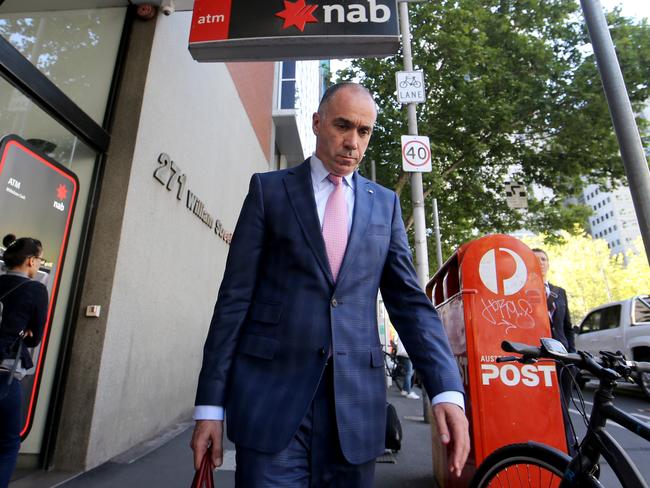NAB chief says repaying clients taking too long, rejects unethical tag
NAB’s Andrew Thorburn admits his bank is taking too long to repay customers charged in the fee-for-no-service scandal — but denies that’s unethical.
Business
Don't miss out on the headlines from Business. Followed categories will be added to My News.
NATIONAL Australia Bank chief Andrew Thorburn has acknowledged NAB is taking too long to repay customers charged fees for services they never received.
But Mr Thorburn, appearing on Monday for the first time at the financial services royal commission, questioned the definition of ethics when asked whether the bank acted unethically by taking so long.
COMMONWEALTH BANK CHIEF MATT COMYN TAKES THE STAND
WESTPAC CHIEF QUESTIONS MYSUPER RETIREMENT SAVINGS
He was shown a note from the Australian Securities and Investments Commission regarding the bank’s remediation efforts.
The note, from November 2017, indicated NAB was “out of step” with other banks in continuing to argue about the methodology of repaying customers rather than simply getting on with the job of returning fees it should not have taken.
Counsel assisting the commission Michael Hodge, QC, asked Mr Thorburn whether “this was an ethical approach”.
Mr Thorburn answered: “Well, it depends what you mean by ethics”.
“I think it ended up being too technical and too legal. But the way I think of ethics I don’t think this was unethical,” he said.

“I do believe the outcome of it is that we have not earned our customers’ trust.” Pressing the issue, Mr Hodge asked whether, setting aside the word “ethical”, it was the right thing to do. Mr Thorburn said “no”.
On the broader fee-for-no-service scandal, which included NAB charging fees to dead people, Mr Thorburn did not accept that charging fees for a service the bank did not provide was dishonest.
He acknowledged such a practice was “wrong”.
“It’s absolutely wrong,” he said. But he added: “Dishonesty would go to the intent and I don’t feel it was dishonest in that respect”.
The commission also heard that a memo to the NAB board in December 2016 raised that the scandal had “potentially significant implications, including potential revenue at risk and compensation payable under various scenarios”.
Mr Hodge asked whether this was what drove the bank to drag its feet around methodology, as NAB was unable to track how much of the fee pool paid over a six-year period to financial advisers licensed to the bank — but not employed directly — was justified. This could equate to $600 million if the bank paid back anyone in that category where records were unclear, he said.
Mr Thorburn said he did not know “that specific number”.

Mr Hodge said: “The problem … is that you just don’t have any records or very few adequate inadequate records.”
Mr Thorburn replied: “Well, I think we don’t know that yet.
“I think that’s the process we’re going through.”
He was also accused of pinning the blame for mishandling of scandals on NAB’s former consumer banking and wealth chief, Andrew Hagger.
“Somebody looking at your statement and listening to the evidence that you’ve given today might think that you are, to the maximum extent possible, passing responsibility for this to Mr Hagger, the senior executive who has been made redundant and left the bank,” Mr Hodge said.
“Is that what you are doing?”
Mr Thorburn disagreed. He acknowledged there were three other executives — including himself — who were aware of the methodology for dealing with the fee-for-no-service issue.
Mr Hodge also inquired about the bank’s “Introducer” program, which has been linked to fraud by staff in western Sydney NAB branches. Under the scheme, people in other professions were paid when they referred customers to NAB who then took out home loans.
Mr Thorburn acknowledged that in its original form, the program had been problematic.
Later in the day, NAB chairman Ken Henry took the stand and was asked about trying to reform the culture at the lender.
He said this could take up to a decade.
Mr Henry also argued that it was hard for boards to “ensure” a particular culture for a bank.


